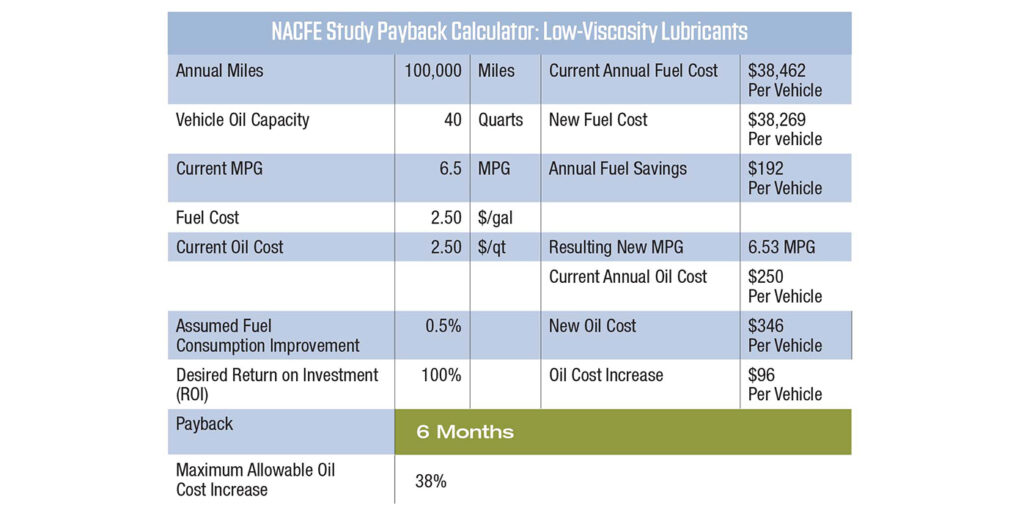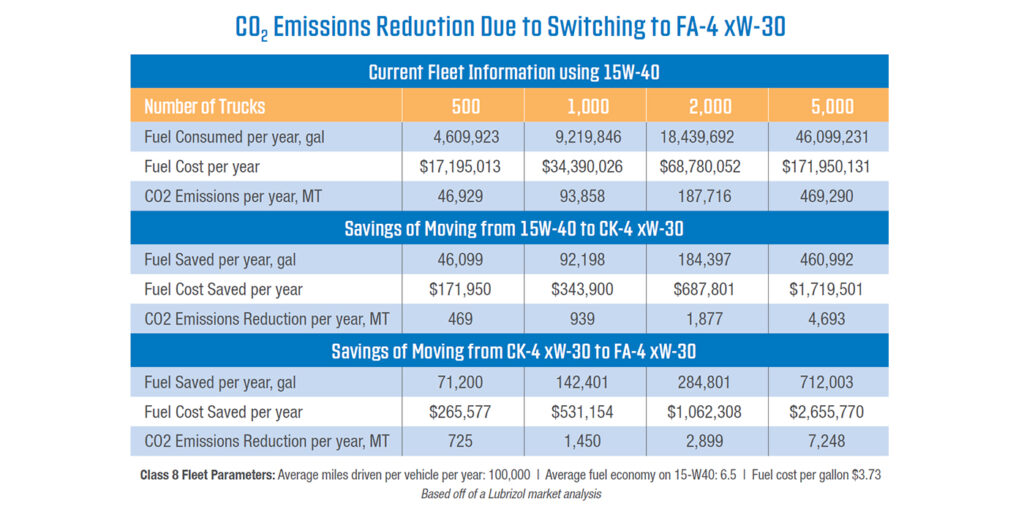Decreased-viscosity motor oil formulations have been available in the hefty-obligation trucking market for virtually 6 many years. Even with some desirable gasoline financial state benefits that these decreased-viscosity formulations provide, they retain just a trim sector share among all available formulations. Why is this the case? It’s been revealed that Class 8 more than-the-highway fleets can realistically assume fuel personal savings in the variety of .5{09e594db938380acbda72fd0ffbcd1ef1c99380160786adb3aba3c50c4545157}–1.5{09e594db938380acbda72fd0ffbcd1ef1c99380160786adb3aba3c50c4545157} by switching from an API CK-4 certified 15W-40 formulation to 5W/10W-30 engine oil (really worth noting: 15W-40 lubricants make up the majority of the industry share). In addition, the financial savings from switching to the fuel-successful API FA-4 variant can be expected to incorporate a even further .4{09e594db938380acbda72fd0ffbcd1ef1c99380160786adb3aba3c50c4545157}–0.7{09e594db938380acbda72fd0ffbcd1ef1c99380160786adb3aba3c50c4545157} of elevated gas effectiveness.
Click on In this article to Browse Additional
CK-4 vs. FA-4: What’s the Variation?
In 2016, the American Petroleum Institute (API) produced a fundamental alter in how significant-obligation engine oils are licensed for use during North The usa. In addition to introducing the new CK-4 effectiveness category, API introduced FA-4—a independent specification for lessen-viscosity engine oils specially formulated to provide improved fuel overall economy benefits for fashionable engine components by using less resistance among relocating motor components. For each API requirements, each CK-4 and FA-4 oils deliver the similar concentrations of substantial general performance and motor security.
In gentle of some of the latest difficulties the trucking marketplace has dealt with, alongside with growing fuel fees, it is worthy of investigating why lots of in the trucking area are forsaking an avenue by which they could be equipped to noticeably impression their bottom line for the much better. With this in intellect, let’s deal with some widespread myths about decrease viscosity and FA-4 lubricants:
Fantasy #1: Lessen-viscosity lubricants never guard an motor as well
1 of the most pervasive myths about reduce-viscosity lubricants in the major-obligation trucking marketplace is that thinner oils do not supply as considerably robust protection as a thicker oil. While this may well have as soon as been correct, developments in additive chemistry and formulation know-how have enabled modern-day lubricants to produce superb motor safety in reduce-viscosity formulations.
Founded effectiveness resides within the CK-4 and FA-4 overall performance classes them selves. All accredited lubricants ought to fulfill the same efficiency conditions no make a difference the viscosity quality. Think about also that North American OEMs manufacturing facility fill most new-model engines with 10W-30 quality lubricants, indicating their confidence that decreased viscosities are a valuable choice and excellent for modern motor design. Additive organizations, oil providers, and OEMs have produced hundreds of tens of millions of miles on decreased-viscosity oils and API FA-4 oils in genuine-world subject tests. Screening covers all major OEM engines in a large wide range of responsibility cycles. This screening is done to validate the efficiency and durability of decreased- viscosity CK-4 and FA-4 engine oils.
Myth #2: Utilizing FA-4 will void your guarantee
Ideal now, a few engine OEMs explicitly approve the use of FA-4 lubricants in their vehicles—Detroit Diesel, Cummins, and Navistar. And although the remaining big OEMs may perhaps continue to recommend and factory fill with CK-4, that does not automatically mean making use of it will trigger your vehicles to fall out of warranty.
It can be beneficial to comply with advisable guidelines—and when in question, seek the advice of your company. For illustration, the Technological innovation and Maintenance Council (TMC) will be publishing a new recommended follow (RP) in their 2022-2023 RP handbook, on how large-responsibility car operators can regulate their swap to decreased-viscosity motor lubricants. The recommendations are as follows:
• If your fleet operates engines that are newer than model-year 2010, and individuals autos are manufactured by OEMs that approve the use of FA-4 lubricants, they are a good possibility for people motor vehicles.
• For more recent motor vehicles by OEMs who have not explicitly advised FA-4, TMC endorses contacting the suppliers to determine if oil tips have not long ago transformed to contain FA-4.
• For any motor vehicles newer than design-year 2010, TMC endorses fleets at least think about adopting 10W-30 or 5W-30 CK-4 lubricants to consider gain of the fuel performance positive aspects.
Myth #3: FA-4 will charge me a lot more income.

There is some truth in this myth—barrel to barrel, FA-4 lubricants are far more expensive than their CK-4 counterparts. But that does not necessarily mean it will final result in bigger whole charge for you.
By contributing to improved gas economy, FA-4 lubricants can in reality direct to a lot less whole overall gas costs for you. Contemplate that gas charges stand for about 24{09e594db938380acbda72fd0ffbcd1ef1c99380160786adb3aba3c50c4545157} of the regular fleet’s value for every mile, according to the ATRI Trucking Evaluate. With fuel prices mounting, that determine could increase, earning any way to preserve on fuel prices extra beautiful.
In accordance to the North American Council for Freight Effectiveness (NAFCE), the gains of upgrading to lessen-viscosity lubricants are clear minimize, and can guide to a return on financial commitment in as minimal as six months. This is a more substantial effects than some other gasoline-economic climate actions (distinct tires, for case in point, or aerodynamic insert-ons) can have, and unquestionably worthy of investigating if you are interested in chopping back on fuel costs.

Lubrizol has also carried out its own evaluation of likely fuel savings. Based on the measurement of your fleet, switching from a CK-4 lubricant to FK-4 lubricants can guide to a opportunity yearly personal savings of additional than $2 million on gasoline expenses though considerably minimizing your fleet’s CO2 emissions.
Fantasy #4: True-entire world success won’t match FA-4 screening info.
Serious-planet overall performance does not always match what is seen in the lab—and when measuring fuel economic system, every thing from unique driver conduct to climate disorders can have an impression. Supplied these variables, it’s fair to question regardless of whether the fuel economy benefits of FA-4 will translate to your fleet.
At Lubrizol, we have field-examined FA-4 lubricants in authentic-earth engines from a wide variety of OEMS, creating above 75 million miles of tests. Trucks our teams have analyzed include new types created to be crammed with FA-4 lubricants, and more mature-model trucks in which FA-4 is not specified by the producer. By means of this screening, we have noticed heavy-duty fleets reach substantial gas economy personal savings all whilst furnishing their trucks with excellent security. In 1 test, a 10W-30 FA-4 formulation assisted preserve a fleet 2.2{09e594db938380acbda72fd0ffbcd1ef1c99380160786adb3aba3c50c4545157} savings on gasoline costs when compared with a typical CK-4 10W-30 formulation. Thinking about that gas is usually 1 of the leading working expenditures for fleets, these kinds of success can make a significant variance to your base line.
If you’d like to see the prospective, it is worthy of commencing the dialogue with your oil supplier about probably managing some screening of your individual. A trusted provider should be in a position to assist you operate FA-4 tests devoid of complete conversion solely, and you can see the impact for by yourself. Due to the fact regardless of some of these pervasive myths, FA-4 lubricants are one of the finest techniques fleet administrators have to raise fuel economic climate and help you save on expense. Start the discussion currently.